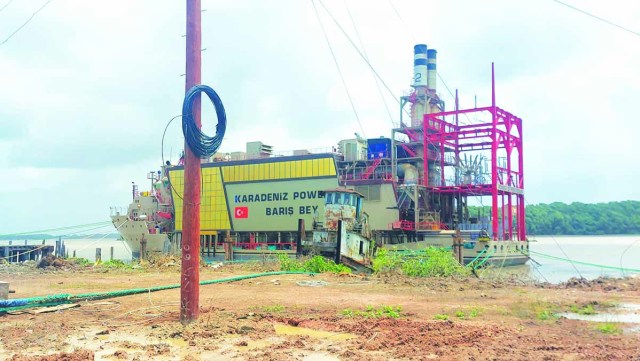Fisherfolk operating in the Berbice River are up in arms over damage being caused to their equipment by huge chunks of cut grass floating down the Canje River.
Rishiram Ramkissoon, Chairman of the East Bank Berbice Fishermen’s Co-op Society, also known as the Three-Door Fishermen’s Co-op Society, has said he recently attended a meeting with officials of Region Six, and it has been decided that the grass in the Canje River would be cut into ten-foot portions and allowed to float out to the confluence of the Berbice and Canje rivers.
He said that when that decision was taken, he had suggested that the grass should not be allowed to float out of the Canje River and into the Berbice River.
“It is the same square one that you will end up with when the stuff comes out into the Berbice River, (where it would be) impeding the progress of fishermen.

Now the entire Berbice River is filled with grass. We have some ‘islands’ coming out from the Canje River. The stuff is about 20 feet in length, and the agreement was 10-feet square,” Ramkissoon told Agriculture Minister Zulfikar Mustapha. “Even to that I wasn’t in agreement with. Now the fishermen are suffering; the grass is entangling their nets.”
As such, he is calling for assistance for the fishermen, and is cautioning about the impact the issue is having on their livelihoods.
At the time engaging residents of East Bank Berbice communities, Minister Mustapha noted that the issue is an old one, and that systems had been put in place to negate the deleterious effects the cut grass is having on the livelihoods of fisherfolk who ply their trade in the Berbice River.

“Instead of giving them two cleanings per year, we are giving them four, and that means that the grass would not have gotten so big if they maintained (cutting) on time. Every three months they have to do maintenance,” Mustapha explained.
He deemed it unacceptable to have twenty-foot-long ‘islands’ floating out of the Canje River into the Berbice River, and said, “I will call the contractors…they will have to ensure that they abide with the agreement that they have to cut the grass in smaller chunks, and at the same time maintain it more regularly; because they are being paid for four cleanings.”
Grass growing along the banks of the Canje River and protruding into the river used to be cut twice annually. However, representation made to the Agriculture Ministry by the Regional Democratic Council (RDC) in regard to the concerns of those who use the river, coupled with complaints made to President Dr Irfaan Ali by mostly residents of communities along this river, has resulted in him instructing that the grass be cut quarterly, instead of bi-annually.
Meanwhile, Agriculture Minister Mustapha has also been informed of the damaging effects that dumping of waste oil from the power ship presently stationed at Everton is having on the livelihoods of fisherfolk.
“The oil is chasing the fishes out from the area!” he has been told. In response, he has said, “If they are throwing fuel into the river from the power barge, that is bad. I will talk to the Prime Minister and the head of GPL (Guyana Power and Light) about it. It is unacceptable. They can’t throw oil into the river; they are polluting the river.”
Discover more from Guyana Times
Subscribe to get the latest posts sent to your email.










